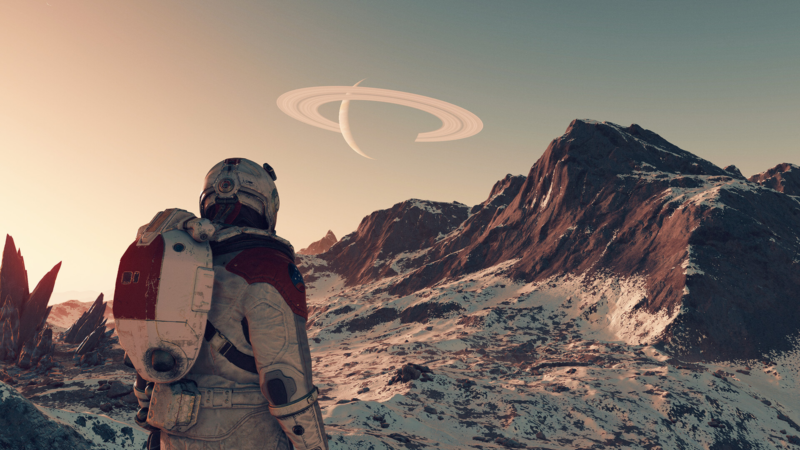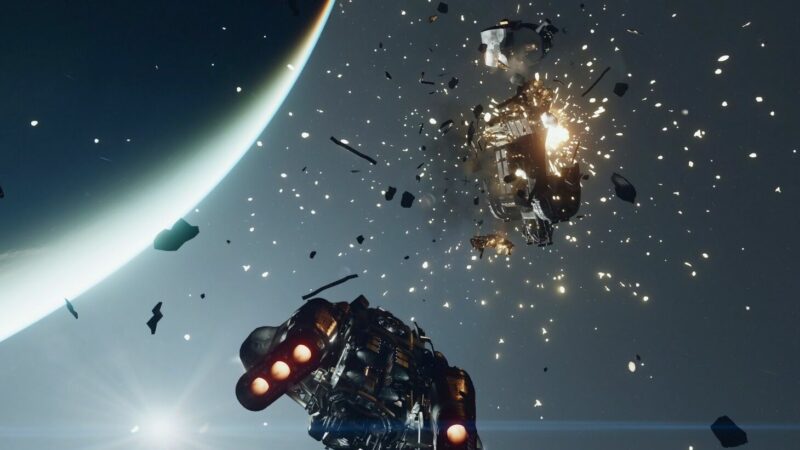
Composer Inon Zur talks exclusively to us about creating the score for Starfield – and how his music formed the backbone of Bethesda’s sprawling sci-fi universe.
While the majority of us only stepped into Starfield’s vast universe over the course of the past few months or so, it’s been eight years since Inon Zur took his first small steps towards scoring Bethesda’s latest action RPG. The studio’s first new IP in over 25 years, Zur’s work has played a pivotal role in shaping not just the game’s sound, but its entire development.
“You’re growing with the game,” Zur muses. “They could take my music and play it to the artists as they start to conceptualise their art and ideas. They’re listening to it, and then I’ll receive some of their drawings. Then that sparks something in me that I want to write. All of it works together. It’s really great.”
While it’s uncommon – though not unheard of – for a composer to be involved in a game’s production right from the outset, given that Zur’s relationship with Bethesda spans several decades, it’s hardly surprising.
Zur’s musical path seemed inevitable from a young age. His parents played him everything from Mozart, Bach and Beethoven to The Beatles, as well as music from his native Israel. He began playing piano aged eight and soon began writing his own melodies and compositions. Following a brief stint of military service, he gravitated towards composing for television, scoring the likes of Digimon and Power Rangers. His first chance to work in games came in 1996 – an opportunity he initially turned down.
“In the beginning, I really didn’t know anything about it,” Zur recalls. “But these people were very persistent and they explained that I’d get to record orchestras and everything.”
And he did. For his first videogame score, Star Trek: Klingon Academy, Zur would record with the Seattle Symphony and its choir – still a relative novelty in the early 2000s. Since then he’s penned the original scores for the Dragon Age, Crysis and Syberia franchises and established himself as Bethesda’s go-to musical talent, composing the sweeping orchestral scores for the likes of Fallout 3, Fallout 4, Elder Scrolls: Blades and, most recently, Starfield.
“With computer games, you’re not really bound or locked to a picture,” he explains. “You could have an intro and the themes and development or capitulations – all these classical terms that we learn in university, but never really got to do when composing for media. Games actually turned the whole thing around. I could apply myself to more traditional writing, which was really amazing.”
Bethesda affords Zur a unique way of working, where he’s often brought in early, long before production of a game has begun in earnest. In the case of Fallout 4, which was released in 2015, Zur came aboard in 2012. For Starfield, Zur’s involvement dates back to 2015, when he was invited by Bethesda’s director and executive producer, Todd Howard, to start mulling over ideas for his long-gestating new project.
“Todd has always said that he likes to start with two things: story and music,” he explains. “These are the two elements that he always likes to start with, because he knows that, from an emotional point of view, this is what sets up the tone for everybody – the developers, the artists, the programmers. So that’s how he starts.”
Based on those early conversations alone, Zur would create 20 to 30 minutes of music, which not only steered creative production, but also ended up in the final game.
“That never usually happens,” he laughs. “But with Bethesda, it’s a very different way of working and I’ve grown really attached to it. It just allows me to be, not only part of the game, but part of the inception of the game, and how it grows and comes to be. It makes the whole process more thoughtful and more in depth. I know that every note, every chord, every idea that I’m going to come up with could influence the game in terms of where it’s going to go. You feel that what you do is really part of creating the game.”


Suggested product
SPECIAL BUNDLE! Film Stories issue 54 PLUS signed Alien On Stage Blu-ray pre-order!
£29.99

Taking inspiration from the likes of Debussy, Ravel, Brahms and Holst, Zur dug deep into the works of the greats for inspiration. But given the sci-fi genre’s rich musical heritage, there was plenty for Zur to draw from when it came to sketching ideas. With nods to the work of composers John Williams and Jerry Goldsmith, Starfield’s score boasts a wistful nostalgia for its genre forebears right out of the gate.
“Starfield is interesting, because it’s about the far future,” Zur observes. “But we wanted people playing it to feel that this is their present and their current existence. You could create it by trying to craft a realistic environment. Not everything is shiny and beautiful, it’s a little beaten and scratched, but with some winking towards nostalgia. The way I do it is by weaving in 16-bit or 8-bit analog synths, that people familiar with older films from the 70s and 80s will recognise.”
Initial conversations with Todd Howard didn’t pertain to musical references specifically, however. Instead, Zur was led by the lofty themes that Howard wanted to explore within Starfield’s narrative.
“Todd just said, ‘My dream is to do a sci fi game with a deep philosophical dive-in, trying to answer the most basic questions: where did we come from? Where are we going? What’s our destiny? Who we are.’ I just took it from there. The mixture of music that I had in my mind that I thought would work is what I came up with. In 2016, he didn’t really know how the game was going to end. In fact, some of the ideas we were tossing around together in that meeting ended up taking shape in the game.”
Given the game’s scope and scale, Zur’s soundtrack for Starfield is a mammoth listen in its own right, clocking in at just under five hours in total. Encompassing everything from exploration, combat music and general ambience, its production was no small feat. And while the uninitiated might assume that scoring a game of this scale is a strictly regimented process, the time that Bethesda afforded Zur meant that the score’s development was much more freeform than other projects.

“You really take it one thing at a time,” he says. “Mark Lampert, the audio director from Bethesda, would tell me, ‘Today, let’s talk about this planet, because there are few planets like this,’ or ‘This is an icy planet, like Hoth from Star Wars. Let’s see what we want to write for that.’ It’s all building blocks, and you don’t really start looking at the massive amount of music you’re working on, because you’re always focusing on a different area, or a different style.”
It’s an approach that mimics that of the wider Bethesda team, where constituent elements eventually make up one cohesive whole. While everyone’s ultimately working towards the same end goal, the process enables the time to hone in on finer details.
“We don’t look at the big picture,” Zur adds. “And this is also how Mark works. This is how the developers work. It’s like, ‘Alright, let’s develop this place. Let’s develop this map.’ Eventually, you look back and say, ‘Okay, this is what we did here. Maybe we could link it to some other places because it reminds us of something’.”
Read more: Keeping Score | The growing popularity of the film soundtrack
In addition to the various worlds players will visit and factions they will encounter, all of which need to be accounted for musically, there are different play states that need to be reflected in the score. Combat, in particular, is one element where variation is vital in ensuring the player doesn’t grow fatigued due to repetition.
“It takes time and a lot of thought,” Zur says. “Each one’s going to be a little different in terms of orchestration. There’s going to be low intensity combat, mid intensity combat and there’s big combat, which always has other major themes within it. Each one of them will have to vary to fit in different places of the game and avoid becoming repetitive. This is all part of the process.”
With the music recorded, it then has to be embedded into the game’s systems, a process that sees the game’s audio team finalising how the player ultimately hears it. It’s at this point that the years of work all come together – and for Zur, it’s a stage in the process that never loses its sense of magic.
“When I’m travelling to Bethesda, I want somebody else to play the game,” he laughs. “I just want to sit and watch it, and the feeling is amazing. You can see the whole thing taking shape, materialising in front of your eyes. Seeing what you’ve imagined each cue doing coming alive inside that world is a really satisfactory feeling.”
Starfield and Starfield: The Original Game Soundtrack are both out now.






